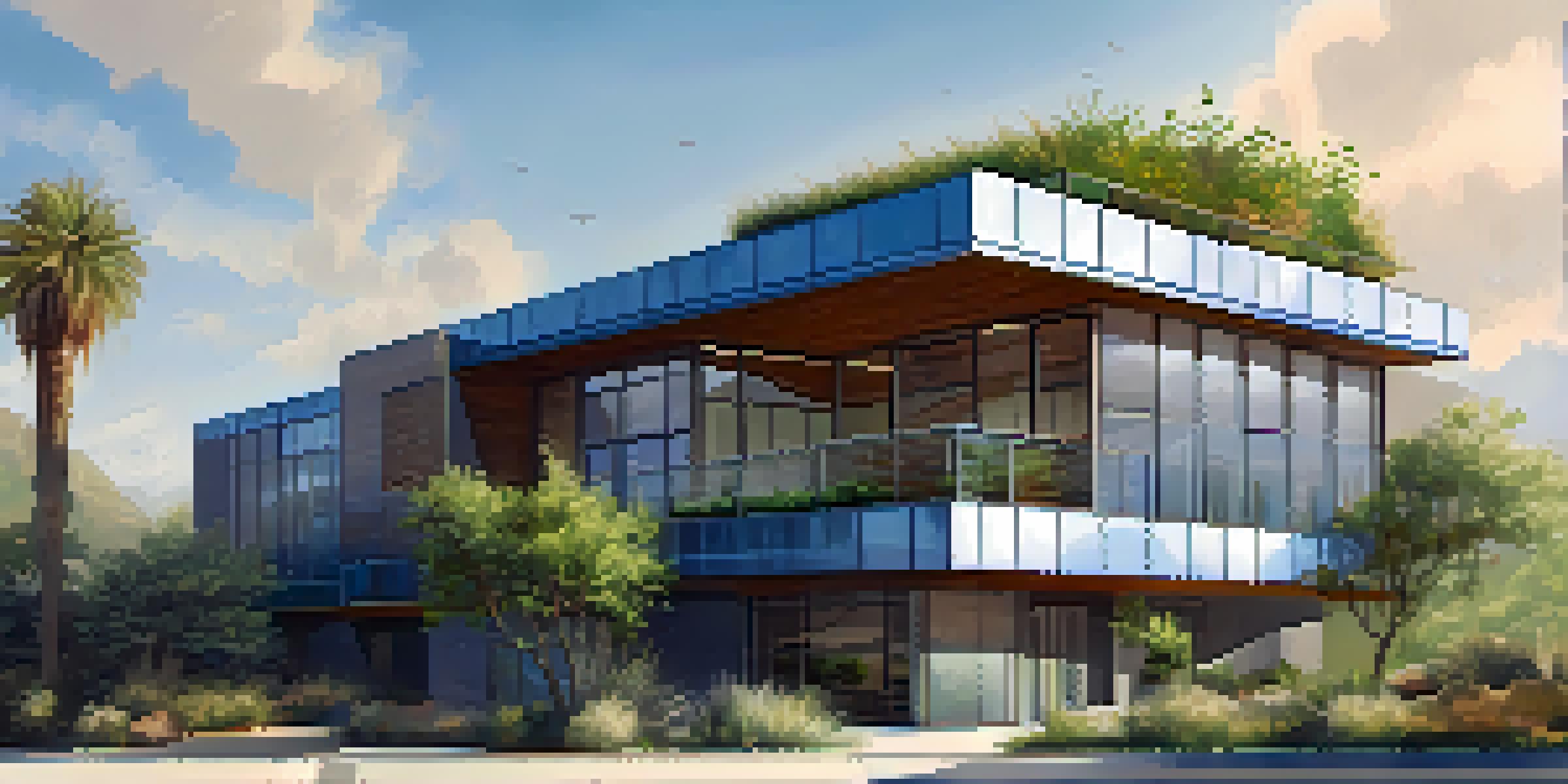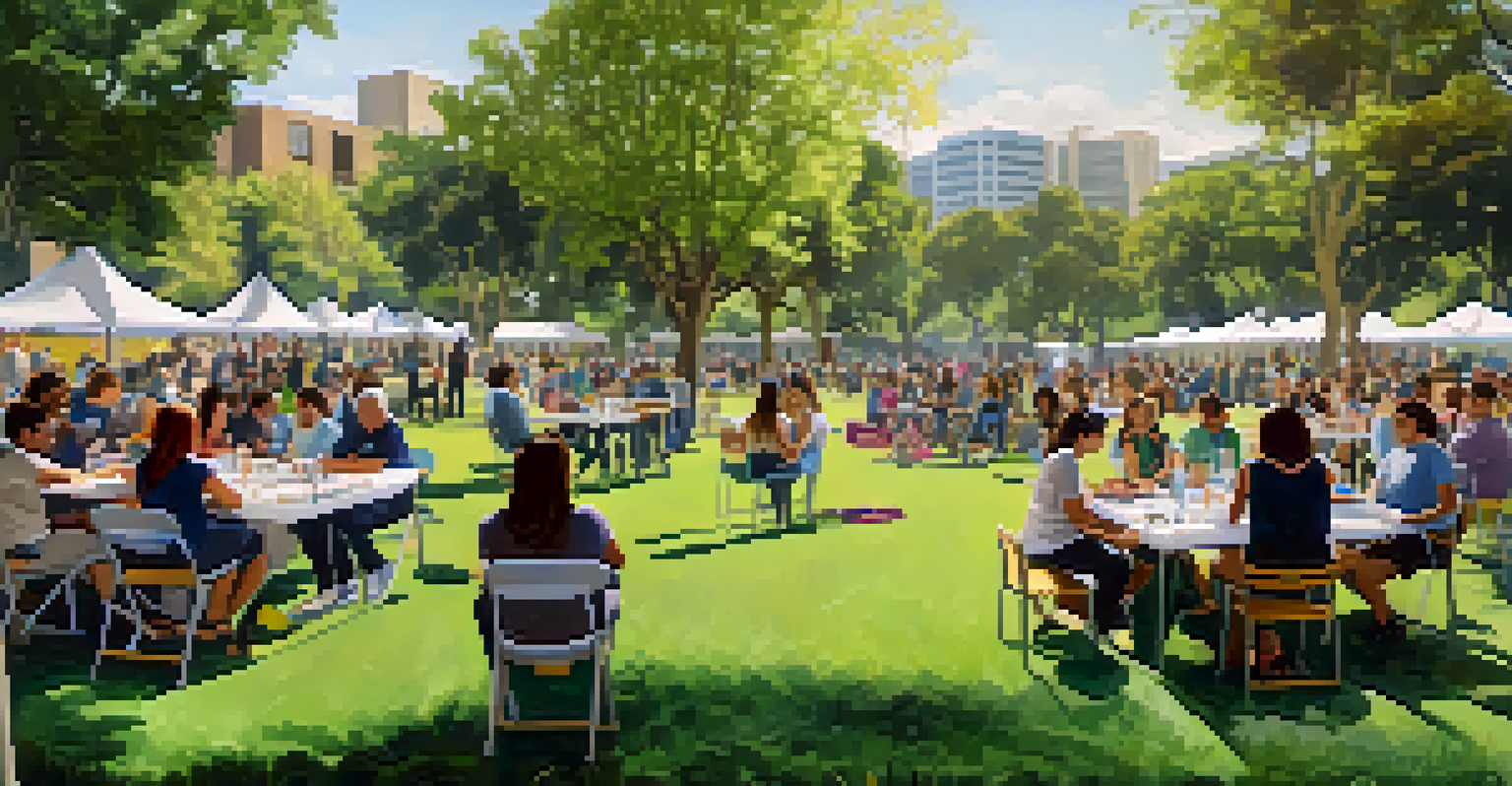Sustainable Practices in Los Angeles Real Estate Projects

Understanding Sustainability in Real Estate Development
Sustainability in real estate refers to designing and constructing buildings that minimize environmental impact. This approach not only focuses on energy efficiency but also considers the health and well-being of the occupants. In Los Angeles, where urban density is high, adopting sustainable practices is crucial for creating livable spaces.
Sustainability is not a destination, but a journey that requires continuous learning and adaptation.
By integrating sustainable methods, developers can contribute to a greener city while also attracting eco-conscious buyers. This involves using renewable materials, optimizing energy consumption, and enhancing water conservation efforts. The goal is to create spaces that are not only efficient but also enrich the community.
As we dive into the specific practices adopted in LA, it becomes clear that sustainability isn’t just a trend—it’s a necessary evolution in how we think about real estate. From eco-friendly materials to innovative technologies, these practices are reshaping the landscape of urban living.
Utilizing Green Building Certifications
One of the cornerstones of sustainable real estate in Los Angeles is the adoption of green building certifications such as LEED (Leadership in Energy and Environmental Design). These certifications establish a framework for creating efficient, high-performing buildings that are easy on the environment. Developers often pursue these credentials to demonstrate their commitment to sustainability.

LEED-certified buildings typically consume less energy and water, resulting in lower utility bills for occupants. Moreover, these buildings often offer improved air quality and increased natural light, making them more appealing to potential buyers or renters. The investment in green certifications often pays off in the long run, both economically and environmentally.
Sustainability Shapes LA Real Estate
Sustainable practices in real estate development in Los Angeles focus on reducing environmental impact while enhancing occupant well-being.
As more projects receive these certifications, LA is evolving into a more sustainable city. This trend not only enhances the reputation of developers but also fosters a community of environmentally conscious residents who prioritize sustainable living.
Incorporating Renewable Energy Solutions
Renewable energy solutions, such as solar panels and wind turbines, are becoming increasingly popular in LA real estate projects. With California’s abundant sunshine, solar energy installations are a natural fit, allowing buildings to generate their own electricity. This not only reduces reliance on fossil fuels but also significantly lowers energy costs.
The greatest threat to our planet is the belief that someone else will save it.
Many developers are now incorporating energy storage systems to make the most of these renewable sources. By storing excess energy generated during the day, buildings can sustain energy needs even when the sun isn’t shining. This innovative approach enhances resilience and promotes energy independence.
As more residents and businesses embrace renewable energy, the collective impact contributes to a significant reduction in greenhouse gas emissions. This shift not only helps combat climate change but also positions Los Angeles as a leader in sustainable urban development.
Implementing Water Conservation Techniques
Water conservation is a critical concern in Los Angeles, where drought conditions are a common issue. Developers are implementing rainwater harvesting systems and installing drought-resistant landscaping to address this challenge. By capturing rainwater for irrigation and other non-potable uses, properties can dramatically reduce their water consumption.
Additionally, many new developments are incorporating low-flow fixtures and smart irrigation systems. These technologies help minimize water wastage while maintaining the aesthetic appeal of green spaces. Such practices not only conserve a precious resource but also lower utility costs for homeowners.
Green Certifications Boost Value
Adopting green building certifications like LEED not only demonstrates commitment to sustainability but also leads to lower utility costs and improved living conditions.
As awareness grows about the importance of water conservation, more real estate projects in LA are adopting these techniques. This collective effort reflects a commitment to sustainable living, ensuring that future generations have access to water resources.
Creating Green Spaces in Urban Environments
Incorporating green spaces into urban environments is a vital aspect of sustainable real estate development. Parks, rooftop gardens, and community gardens provide residents with access to nature, promoting mental well-being and social interaction. In LA, developers are increasingly recognizing the value of integrating these green spaces into their projects.
These green areas not only enhance the aesthetic appeal of a neighborhood but also contribute to urban biodiversity. By planting native species and creating habitats for local wildlife, developers can support the ecosystem while providing a refuge for residents. This approach fosters a sense of community connection and encourages outdoor activities.
As cities continue to expand, prioritizing green spaces is essential for ensuring livable urban environments. Los Angeles is setting an example by incorporating nature into its real estate projects, paving the way for healthier, happier communities.
Utilizing Smart Technology in Sustainable Buildings
Smart technology plays a pivotal role in enhancing the sustainability of real estate projects in Los Angeles. By integrating smart building systems, developers can monitor and optimize energy usage, water consumption, and indoor air quality. These technologies allow for real-time data analysis, enabling prompt adjustments that contribute to overall efficiency.
For instance, smart thermostats can learn occupants' habits and adjust temperatures accordingly, reducing energy waste. Similarly, smart irrigation systems can determine the optimal watering schedule based on weather conditions, ensuring that gardens thrive without excess water usage. These innovations not only promote sustainability but also enhance the comfort of living spaces.
Community Engagement is Key
Involving local residents in real estate planning fosters a sense of ownership and ensures that developments align with community needs.
As smart technology continues to evolve, its integration into sustainable real estate will likely become the norm. Developers who embrace these advancements will not only improve their buildings' performance but also attract tech-savvy buyers looking for modern, efficient homes.
Community Engagement in Sustainable Development
Community engagement is a vital component of successful sustainable real estate projects. In Los Angeles, developers are increasingly involving local residents in the planning and decision-making processes. This collaborative approach ensures that projects meet the needs and preferences of the community, fostering a sense of ownership and pride.
By holding public forums, workshops, and surveys, developers can gather valuable feedback and ideas from residents. This engagement can lead to innovative solutions that might not have been considered otherwise. Additionally, when community members feel heard, they are more likely to support and embrace new developments.

Ultimately, sustainable real estate is not just about buildings; it’s about creating thriving communities. By prioritizing community engagement, developers in LA are laying the groundwork for projects that reflect the values and aspirations of their neighborhoods.